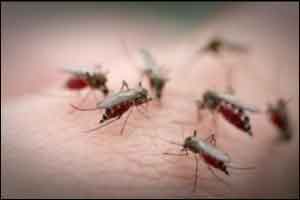- Home
- Editorial
- News
- Practice Guidelines
- Anesthesiology Guidelines
- Cancer Guidelines
- Cardiac Sciences Guidelines
- Critical Care Guidelines
- Dentistry Guidelines
- Dermatology Guidelines
- Diabetes and Endo Guidelines
- Diagnostics Guidelines
- ENT Guidelines
- Featured Practice Guidelines
- Gastroenterology Guidelines
- Geriatrics Guidelines
- Medicine Guidelines
- Nephrology Guidelines
- Neurosciences Guidelines
- Obs and Gynae Guidelines
- Ophthalmology Guidelines
- Orthopaedics Guidelines
- Paediatrics Guidelines
- Psychiatry Guidelines
- Pulmonology Guidelines
- Radiology Guidelines
- Surgery Guidelines
- Urology Guidelines
Newly developed drug found effective against Resistant Malaria : Lancet

Scientists have developed a drug which effectively treats malaria and can help fight strains of the deadly infection that are resistant to existent treatments.Researchers from Tulane University in the US conducted a successful clinical trial of the drug, called AQ-13, on human patients.
In the present randomised, non-inferiority trial Ousmane A Koita et al. compared AQ-13 against artemether plus lumefantrine in men (≥18 years) for treatment of uncomplicated P falciparum malaria.
All the participants meeting eligibility criteria were randomly assigned to either the artemether plus lumefantrine group or AQ-13 group by permuting blocks of four with a random number generator.The participants received either 80 mg of oral artemether and 480 mg of oral lumefantrine twice daily for 3 days or 638·50 mg of AQ-13 base (two oral capsules) on days 1 and 2, and 319·25 mg base (one oral capsule) on day 3. Participants were monitored for parasite clearance (50 μL blood samples twice daily at 12 h intervals until two consecutive negative samples were obtained) and interviewed for adverse events (once every day) as inpatients during week 1. During the 5-week outpatient follow-up, participants were examined for adverse events and recurrent infection twice per week. The results of present clinical trial of Malian men with uncomplicated P falciparum malaria in the per-protocol analysis suggested non-inferiority of AQ-13 to present treatment regimen comprising of artemether plus lumefantrine.
These results, published in The Lancet Infectious Diseases journal, are significant as public health experts have long warned that the parasite responsible for most malaria cases, Plasmodium falciparum, is developing drug resistance.
New medications are needed to build up secondary defences against drug-resistant strains of the parasite.
The drug was able to clear the parasite responsible for the disease within a week, matching the effectiveness of the most widely used treatment regimen.
"The clinical trial results are extraordinarily encouraging," said Donald Krogstad, professor at Tulane University.
"Compared to the current first-line recommendation for treatment of malaria, the new drug comes out very well," said Krogstad.
Mosquitoes infected by a parasite spread malaria, causing more than 200 million illnesses across the globe and more than 400,000 deaths annually.
For decades, chloroquine was used to treat malaria until Plasmodium falciparum developed resistance.
Now, a drug combination - artemether and lumefantrine - is the primary treatment for malaria although resistance is also developing to the drug combination in some countries.
Researchers recruited 66 adult men in Mali with uncomplicated malaria, which is defined as malaria that is not life threatening.
Half were treated with AQ-13 and the other half received artemether and lumefantrine. Both drug groups had similar cure rates.
Researchers hope to expand testing of the drug to more participants, including women and children, before it can be widely recommended as a new treatment.
The same biotechnology that helped the team develop the new drug has also identified similar drugs that also hold promise against drug-resistant parasites, Krogstad said.
"The potential long-term implications are bigger than one drug," he said.

Disclaimer: This site is primarily intended for healthcare professionals. Any content/information on this website does not replace the advice of medical and/or health professionals and should not be construed as medical/diagnostic advice/endorsement or prescription. Use of this site is subject to our terms of use, privacy policy, advertisement policy. © 2020 Minerva Medical Treatment Pvt Ltd